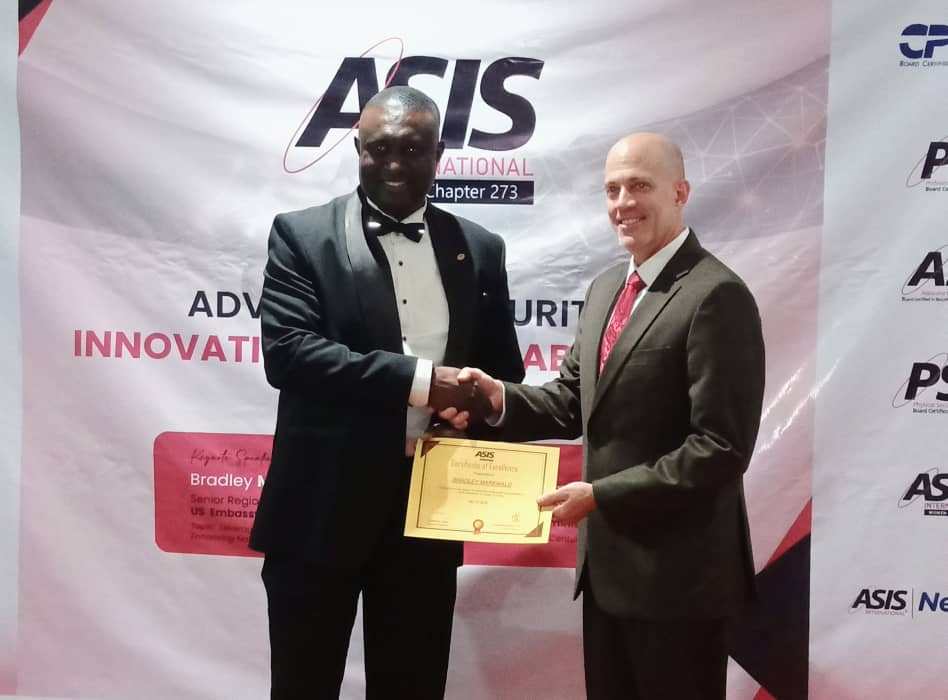By Philip Yatai
The United States Embassy, Abuja, has urged the Federal Government to harness the power of technology to strengthen its security framework and build a safer, more resilient Nigeria.
Mr Bradley Markwald, the embassy’s Senior Regional Security Officer, gave the advice at the 2024 Annual General Meeting of ASIS International, Chapter 273, in Abuja, on Tuesday.
The security expert spoke on the topic, “Leveraging Technology for Enhancing National Security in Nigeria.”
Markwald noted that with Nigeria’s vast population, rich resources, and extensive geographic expanse, safeguarding national security presents both complex challenges and unique opportunities.
He described advancing surveillance and monitoring as “critical transformative ways” which technologies could serve Nigeria’s national security goals.
“By incorporating satellite-based imagery from platforms like the NigeriaSat-X and the European Space Agency’s Copernicus programme, we can monitor vast swathes of land, borders, and critical infrastructure in real time.
“Drones, or Unmanned Aerial Vehicles (UAVs), equipped with thermal imaging and Al-powered tracking software, can be deployed for surveillance in remote areas, providing intelligence on movements and activities of potential security threats.
“The integration of sensor networks along Nigeria’s borders, highways, and ports could offer a proactive approach to security by detecting unusual activity such as unauthorized vehicle movements or crossing of borders in real time,” Markwald said.
He added that technologies like Internet of Things (IoT) sensors could alert authorities to possible incursions or natural disasters that may threaten national security.
These tools, according to him, will not only enhance defensive posture but also help keep Nigerian citizens and businesses safer by enabling timely interventions.
The security expert also called for the modernisation of border control, adding that effective border control was an essential part of Nigeria’s national security strategy and technology could significantly improve this area.
He said that by adopting advanced electronic border systems, Nigeria could enhance the accuracy of border checks and reduce the risks associated with human error.
“Biometric technologies such as facial recognition and fingerprint scanning used in systems like the Advanced Passenger Information Systems (APIS) can quickly verify identities, ensuring that only authorized individuals enter or leave the country.
“Automated Border Control (ABC) gates, already in use in airports around the world, can help streamline this process, making border control both secure and efficient.
“In addition, the use of Smart Border Management Systems, which combine biometric data with real-time tracking of individuals and vehicles at the border, would significantly enhance the ability to manage immigration and trade flows without compromising security,” he said.
Markwald said that the United Arab Emirates had implemented an eGate system that employs facial and fingerprint recognition to streamline immigration while enhancing security.
He added that for Nigeria, adopting cost-effective solutions like Suprema ID’s BioMini Slim 3 fingerprint scanners could make a significant difference.
“These portable devices offer high speed authentication and are durable enough for use in various environments.
“By implementing such biometric technologies, Nigeria can reduce wait times at border crossings, minimize human error, and prevent unauthorised entries.
“This will not only strengthen border management but also enhance the overall efficiency of border security operations,” he said.
The senior regional security officer, equally stressed the need to strengthen cybersecurity and cyber resilience, adding that in today’s digital world, cybersecurity was essential to national security.
According to him, protecting sensitive data, critical infrastructure, and digital systems from cyber threats must be a top priority.
“Advanced encryption protocols like AES-256 encryption and quantum cryptography are essential to safeguarding Nigeria’s most sensitive government and corporate data.
“Technologies such as Next-Generation Firewalls (NGFW), Intrusion Detection Systems (IDS), and Al-powered anomaly detection can identify and mitigate cyberattacks in real time, protecting Nigeria’s key infrastructure from digital threats.
“Moreover, Nigeria can invest in a robust cyber defense infrastructure that includes state-of-the-art Security Operations Centers (SOC), empowered with the latest Al-driven solutions for detecting and responding to cybersecurity threats and equipped with the latest tools for real-time monitoring and incident response.
“The National Computer Emergency Response Team (ngCERT) can adopt advanced cyber defense systems such as FireEye’s Network Security and Forensics, which provide real-time threat detection and response capabilities.”
He further called for enhanced intelligence sharing and collaboration, improving crisis management and incident response
“The commitment to adopting and investing in these technologies will help Nigeria better protect its citizens, safeguard critical infrastructure, and secure the nation’s future.
“Together, let us work to leverage these advancements to create a safer Nigeria for generations to come,” he said. (NAN)
Edited by Mark Longyen












